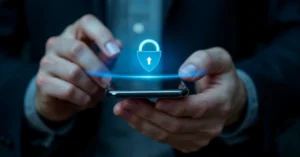Windows is the go-to desktop OS, while the surface line of portable products caters to everyone from students to on-the-go power users. Want to keep any sensitive data you keep on such devices out of harm’s way? This is way easier than you think, and our quickstart guide has got you covered!
Secure the Device
The first step towards comprehensive data protection is to secure the device(s) you store this data on. If you’re still using a Windows phone, you’ll want to limit access by setting up a PIN. It should be as long as the device allows and engage automatically. Similarly, you should protect tablets and PCs with a password or use Windows Hello if the device supports biometrics.
Regular OS updates are a crucial piece of the data security puzzle. Windows remains the most popular operating system, with a 70% market share. That means hackers are familiar with its internal workings and have the most incentive to target users. Microsoft regularly puts out updates that address recently discovered security vulnerabilities while improving existing features.
Similarly, antivirus and antimalware programs are only effective if they use the newest routines. Windows Defender has matured into a competent threat prevention system. Like the OS itself, you’ll want to keep it updated. Installing additional antimalware software and conducting periodic scans just in case won’t hurt either.
Secure the Information Itself
Improving device security doesn’t mean your data is in the clear. Tablets get lost, and hard drives on aging computers are prone to failure. Even if you think you’re doing everything right, carelessly opening an unknown link could infect the device with ransomware. This particularly nasty malware variant can affect core systems as well as personal files, locking you out unless you pay the ransom.
One solution is to encrypt the device or one of its drives via BitLocker. The feature has been around since Windows 8.1 and lets you prevent unauthorized access. Encrypting a drive creates a decryption key tied to your Microsoft account. If your device detects suspicious activity, it will prompt you to enter that key to restore access.
Another is to use cloud storage. Keeping a copy in the cloud makes important information reachable even if your device becomes stolen or damaged. Cloud storage also comes with encryption, so the contents of your files and folders remain safe.
Secure Your Online Connection
Conventional connections like cellular data and home Ethernet or Wi-Fi uphold high-security standards that make them safe to use. However, many of us will jump at the chance to catch up on news or fire off a quick email through a coffee shop’s public Wi-Fi.
That’s the last thing you should be doing since such connections lack fundamental security measures. A hacker could place themselves between you and any site you access and record any login details, payment information, or other sensitive data you do not want to end up in the wild.
Encryption comes to the rescue again, this time courtesy of virtual private networks. If you choose a dependable provider that you can find among the best VPNs the Reddit community recommends, it will do its job well. The main purpose of the VPN is to take over your internet traffic, encrypt the connection, and hide your IP address in the process. It’s a double whammy.
You get a new OP address each time, so linking your online activities with your genuine IP address or identity is impossible. Moreover, the sophisticated encryption enveloping the connection is effectively impervious to cracking unless would-be crooks have a fleet of super-computers and a few millennia at their disposal.
Secure Your Accounts
Windows, VPNs, and any other account-based services are only as secure as the passwords you associate with them. Depending on their strength and uniqueness, passwords can either be potent deterrents or keys to unlocking and taking over your identity.
Password managers ensure the former by generating unique and complex passwords for any and all accounts. These new passwords are successful since they’re one-of-a-kind and hard for humans to remember. The Windows password manager can fill hundreds of them in automatically while allowing access to all through a single master password for you to safeguard.
Pair a password manager with two-factor authentication for maximum effect. Most come with the feature built-in.
Conclusion
As you can see, making your Microsoft devices hacker-proof is straightforward. Follow our tips, and any information you store on them will remain safe and sound.





